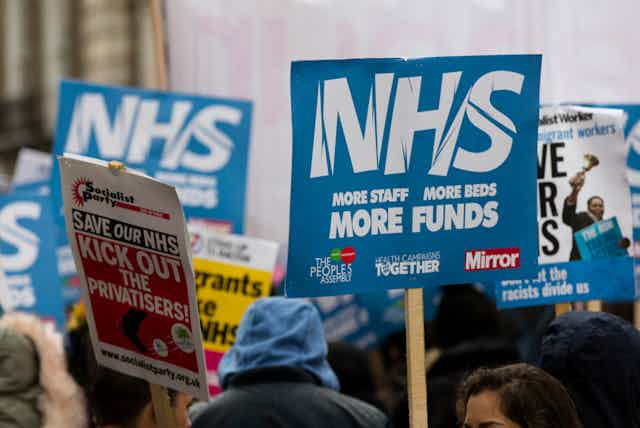The NHS has just turned 75, and the British public find themselves surrounded by jollity. There is a new logo, a 75th-anniversary badge, tea parties with cakes iced in blue, talks in schools, a photography competition, endless articles by people like me, and even some specially made bunting.
Is this 75th anniversary a cause for celebration or does it signal a system in old age, creaking its way into a sad decline? Should it be pensioned off? Or does the long-awaited workforce plan signal investment in the NHS that could give it a new lease of life?
Certainly not everyone is celebrating. Not the 7.4 million people currently on a waiting list, 370,000 of whom have been waiting for more than a year. Not the nurses, doctors, ambulance workers, porters and other staff involved in recent or planned strikes.
And certainly, today’s NHS faces many challenges. Some of them are new, most notably the COVID pandemic and its aftermath, but many are all too familiar.
Familiar challenges include increasing demand from an ageing population and from new technology, some of which is unimaginably costly.
Frail elderly patients with chronic disease have always needed hospital care, but success in helping patients to survive illnesses that would in the past have been life-threatening means that many people now have complex combinations of long-term conditions.
Over the past 75 years, public health pressures have changed somewhat. Undernutrition has been replaced by obesity, air pollution from burning coal has been replaced by air pollution from burning diesel, and industrial injuries have largely been replaced by a physically inactive population.
These different pressures are creating health problems, including diabetes and cardiovascular disease, which we need to learn more about how to prevent. Mental health problems are not new, but awareness of the extent of them may be. Antibiotics, which helped the infant NHS survive, are increasingly losing their power, and the potential threat of antimicrobial resistance should not be underestimated.
Exacerbated
Many of these challenges face all health systems, but some have been exacerbated by UK policy choices.
2010-19 was the NHS’s most austere decade ever, and the strain was showing long before the shock of a pandemic. Waiting times for non-urgent surgery and visits to A&E and GPs were already rising, hospitals were in deficit, and there were problems with recruiting and keeping staff.
Lack of coordination of health and social care is also an old challenge. Creating a national health service alongside social care provided by local government generated tensions from the start. Healthcare was free at the point of use, and a clear national political priority. Social care was means-tested, and provided by local authorities with many competing objectives. Integrated care, so crucial to frail older people and those with complex conditions, remains elusive, and social care has long been under-resourced.
And decades of inadequate workforce planning and reliance on international recruitment of health professionals, alongside new uncertainties relating to the effect of Brexit on the medical workforce, is severely constraining the NHS response to addressing the backlog of care post-COVID.

A recent national survey of attitudes to the NHS and social care reveals real public concerns about the service. Overall satisfaction with the NHS fell to 29% in 2022, the lowest level since the survey began in 1983.
Satisfaction levels fell across the services: hospitals, dentistry, A&E and, most notably, general practice. When the survey respondents were asked what the most important priorities for the NHS should be, making it easier to get a GP appointment and increasing the number of staff were the most common choices.
The long-term workforce plan, released this week, attempts to address these priorities, and includes “the biggest recruitment drive in health service history”. The focus not only on training new staff but on improving ways of working and retaining those the NHS has, is certainly to be welcomed and seems to have cross-party support.

To mark the 75th anniversary of the launch of the NHS, we’ve commissioned a series of articles addressing the biggest challenges the service now faces. We want to understand not only what needs to change, but the knock-on effects on other parts of this extraordinarily complex health system.
Founding principles still supported
Despite the very real concerns expressed by the public attitudes survey, support for the founding principles of the NHS remains extremely strong: 93% of people believe that the NHS should be free of charge, and the vast majority believe it should be available to all and funded through taxation.
Historians tell us that the NHS has been “in crisis” regularly since 1948. We have high and increasing expectations of what the NHS can do for us, and the labour-intensive nature of healthcare means that we should expect it to cost more over time and to increase as a share of the overall economy.
Perhaps the NHS is showing some signs of frailty, but prophets of its imminent demise have been regularly proved wrong. Despite current challenges, the NHS survives and retains the principles of fair access and financial protection that were enshrined 75 years ago. I hope this will continue for another 75 years at least.

